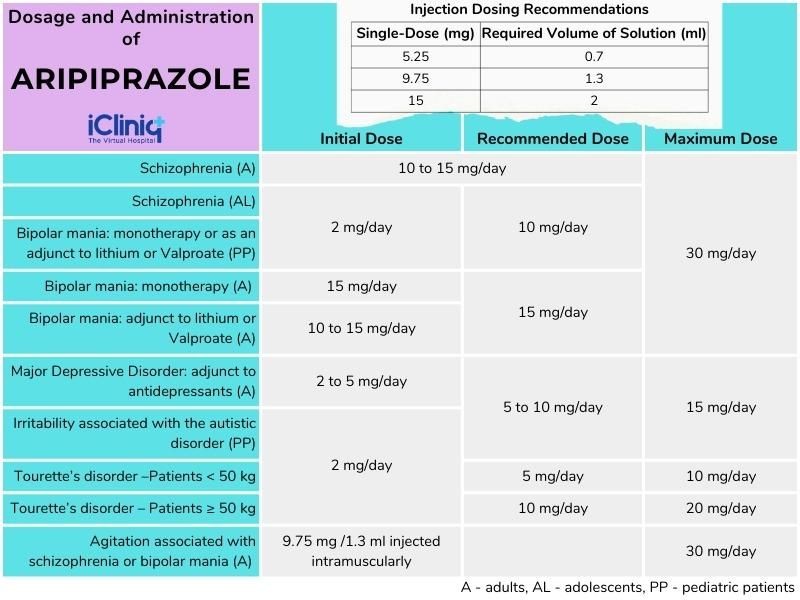
Contents
Abilify vs. Invega
Long-term use of aripiprazole may lead to tardive dyskinesia (involuntary movements of the jaw, lips, and tongue).
Neuroleptic malignant syndrome, a potentially fatal condition, has been reported with antipsychotic drugs, including Abilify. Symptoms of this syndrome include:
- High fevers
- Muscle rigidity
- Altered mental status
- Irregular pulse or blood pressure
- Rapid heart rate
- Excessive sweating
- Heart arrhythmias
All atypical antipsychotic drugs have been associated with metabolic changes such as hyperglycemia, diabetes mellitus, dyslipidemia, and weight gain. Serious cases of hyperglycemia leading to coma or death have been reported. Patients should be tested during treatment for elevated blood-sugars. Patients with risk factors for diabetes should have their fasting levels of blood sugar tested before starting treatment and periodically throughout treatment. Any patient developing symptoms that suggest diabetes during medical treatment should be tested for diabetes.
Elderly patients with dementia-related psychosis treated with antipsychotics are at an increased risk of death and Abilify should not be used for this indication. Antidepressants increased the risk of suicidal thinking and behavior in short-term studies in children and adolescents with depression and other psychiatric disorders. Anyone considering the use of this medicine or any other antidepressant in a child or adolescent must balance this risk of suicide with the clinical need. Patients who are started on medical therapy should be closely observed for clinical worsening, suicidal thoughts, or unusual changes in behavior.
The most common side effects include:
Invega
The most common side effects include:
- Drowsiness
- Weight gain
- Headache
- Upper respiratory tract infection
- Increased heart rate
- Constipation
- Restlessness
- Stiffness
- Tremors
- Slow movements
Less common but serious side effects include:
- Increased risk of stroke and death in elderly patients with dementia-related psychosis.
- Neuroleptic malignant syndrome (NMS) with symptoms such as:
- High fever
- Sweating
- Muscle stiffness
- Confusion
- Loss of consciousness
- High blood pressure
- Rapid heartbeat
- Changes in breathing
- Extrapyramidal side effects (EPS) such as:
- Dystonia (painful spasms of the oral, throat, or neck muscles)
- Akathisia (restlessness)
What are the drugs that interact with Abilify and Invega?
Abilify
- Carbamazepine (Tegretol) can decrease the amount of Abilify in the body. Other drugs that can decrease the body’s levels of Abilify are phenytoin (Dilantin), rifampin (Rifadin), and phenobarbital.
- Ketoconazole (Nizoral) can increase the amount of aripiprazole in the body.
Invega
- Paliperidone can cause low blood pressure.
- Paliperidone is metabolized by liver enzymes. Drugs that increase the activity of these enzymes will decrease blood levels of paliperidone. Paliperidone should not be taken with carbamazepine (Tegretol), phenytoin (Dilantin), rifampin (Rifadin), St. John’s Wort, and other drugs that may decrease its blood levels.
- Paliperidone blocks the effect of dopamine in the brain. Combining it with dopamine agonists such as levodopa (Sinemet) is not recommended.
- Divalproex sodium increases blood levels of paliperidone by 50%. The dose of paliperidone should be adjusted based on clinical judgment.
What is the dosage for Abilify vs. Invega?
Abilify
- This medication is usually taken once a day.
- The usual adult starting oral dose for patients with schizophrenia or bipolar disorder is 10 to 15 mg once daily. The dose may be increased over time up to 30 mg daily.
- The recommended dose for patients with Tourette’s disorder is 5 to 20 mg once daily.
Invega
- Paliperidone is administered once daily by mouth.
- Tablets should be swallowed whole and should not be crushed, divided, or chewed.
- The starting dose for schizophrenia or schizoaffective disorder in adults is 6 mg daily.
- The maintenance dose range is 3 to 12 mg daily.
- The maximum dose is 12 mg daily.
- The dose for treating schizophrenia in adolescents weighing less than 51 kg is 3 to 6 mg daily.
- The dose for adolescents weighing more than 51 kg is 3 to 12 mg daily.
Are Abilify and Invega Safe to Take During Pregnancy?
Abilify
Aripiprazole has not been adequately studied during pregnancy. Neonates exposed to antipsychotic drugs in the third trimester may experience withdrawal symptoms and other side effects. Its use during breastfeeding is not recommended.
Invega
Unborn babies exposed to antipsychotics during the third trimester of pregnancy are at risk for extrapyramidal and withdrawal symptoms after birth. Currently, there is no data on the use of paliperidone during pregnancy. Its effects on breastfeeding infants or milk production are not yet known.
Summary
- Drowsiness
- Dizziness
- Headache
- Lightheadedness


